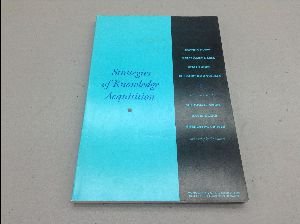Strategies of Knowledge Acquisition (Monographs of the Society for Research in Child Development) - Softcover

Synopsis
What happens when a child's or adult's existing theories come into contact with new evidence? The authors examine these fundamental processes of knowledge acquisition, using a microgenetic method in which the coordination of theory and evidence is followed in sessions over several months. Working on problems in physical and social domains, both children and adults show progress in the level of strategies used—progress that was maintained when new problems were introduced. The authors identify multiple forms of competence—strategic, metastrategic, and metacognitive—involved in the process of developmental change, and they relate their work to issues in the study of conceptual change, causal and scientific reasoning, and the development of thinking skills.
"synopsis" may belong to another edition of this title.
From the Back Cover
In this Monograph, knowledge acquisition is examined as a process involving the coordination of existing theories with new evidence. Central to the present work is the claim that strategies of knowledge acquisition may vary significantly across (as well as within) individuals and can be conceptualized within a developmental framework.
"About this title" may belong to another edition of this title.
Other Popular Editions of the Same Title
Search results for Strategies of Knowledge Acquisition (Monographs of...
Strategies of Knowledge Acquisition (Monographs of the Society for Research in Child Development)
Seller: HPB-Red, Dallas, TX, U.S.A.
Paperback. Condition: Acceptable. Connecting readers with great books since 1972. Used textbooks may not include companion materials such as access codes, etc. May have condition issues including wear and notes/highlighting. We ship orders daily and Customer Service is our top priority! Seller Inventory # S_445479518
Strategies of Knowledge Acquisition (Monographs of the Society for Research in Child Development)
Seller: Housing Works Online Bookstore, New York, NY, U.S.A.
Condition: Very Good. Minimal wear to cover. Pages clean and binding tight. Shelfwear. Bumped edges. Paperback. Seller Inventory # AD3-03150
Strategies of Knowledge Acquisition [Monographs of the Society for Research in Child Development, Serial No. 245, Volume 60, No. 4]
Seller: Tiber Books, Cockeysville, MD, U.S.A.
Paperback. Condition: Very Good. . . . . 8vo, paperback. Vg condition. Contents bright & clean, binding tight; covers glossy. Exterior slightly rubbed from storage. vi, 160 p. Seller Inventory # 1140520.51

